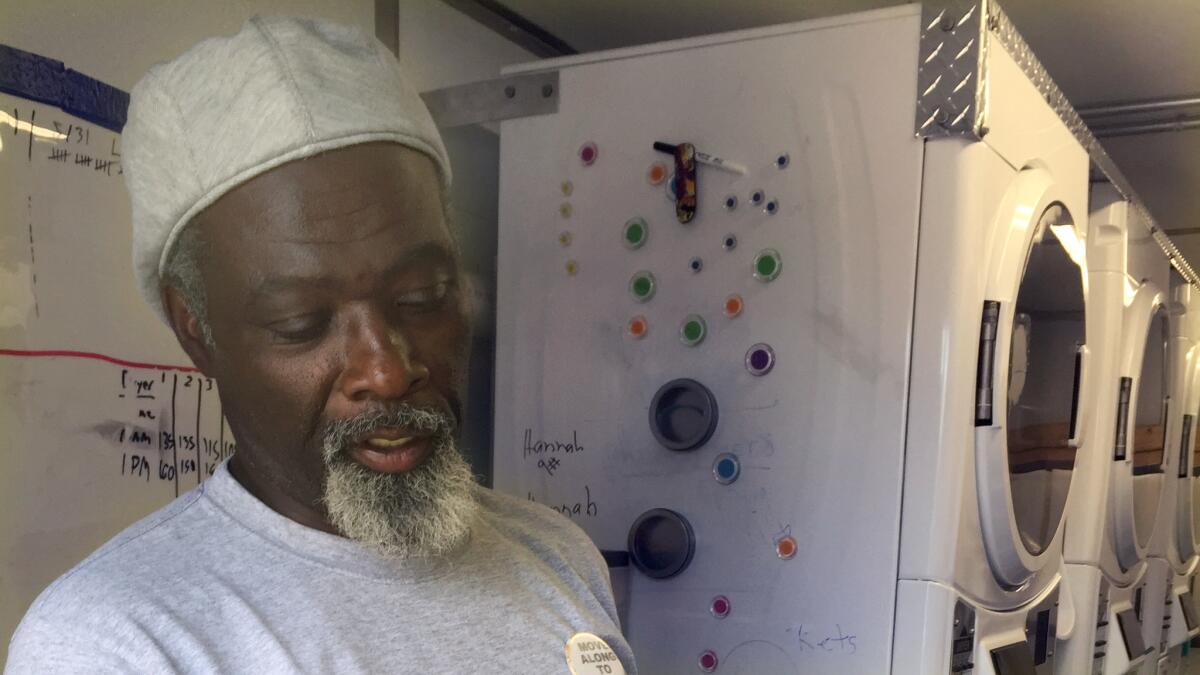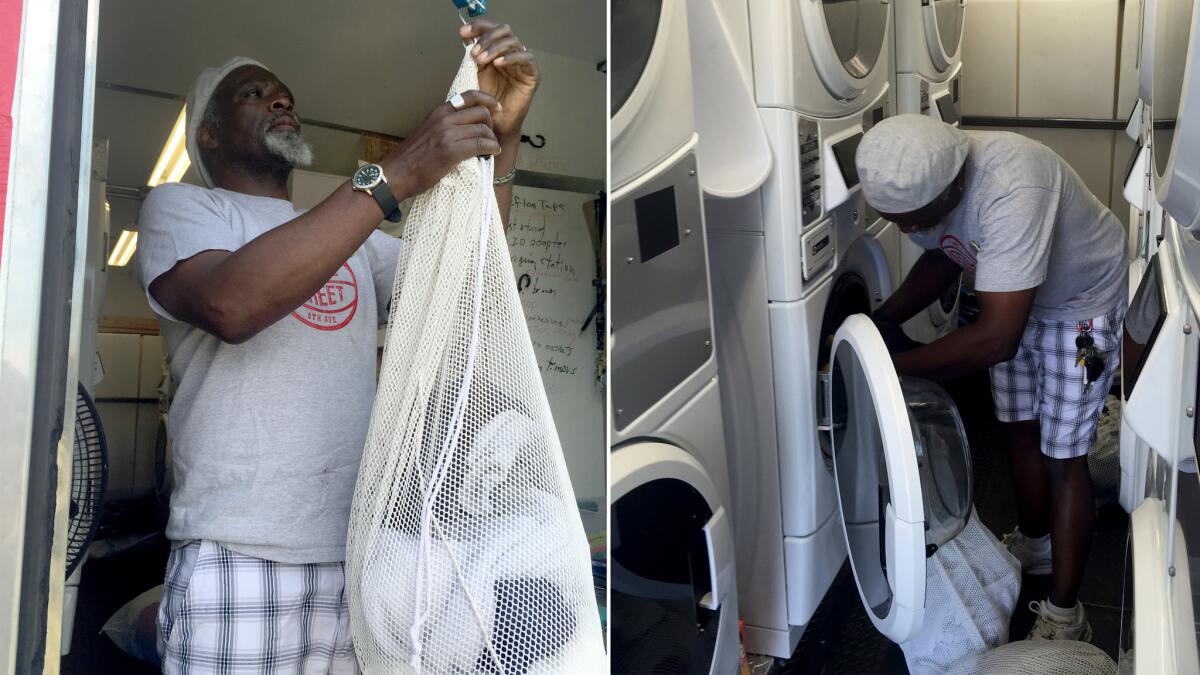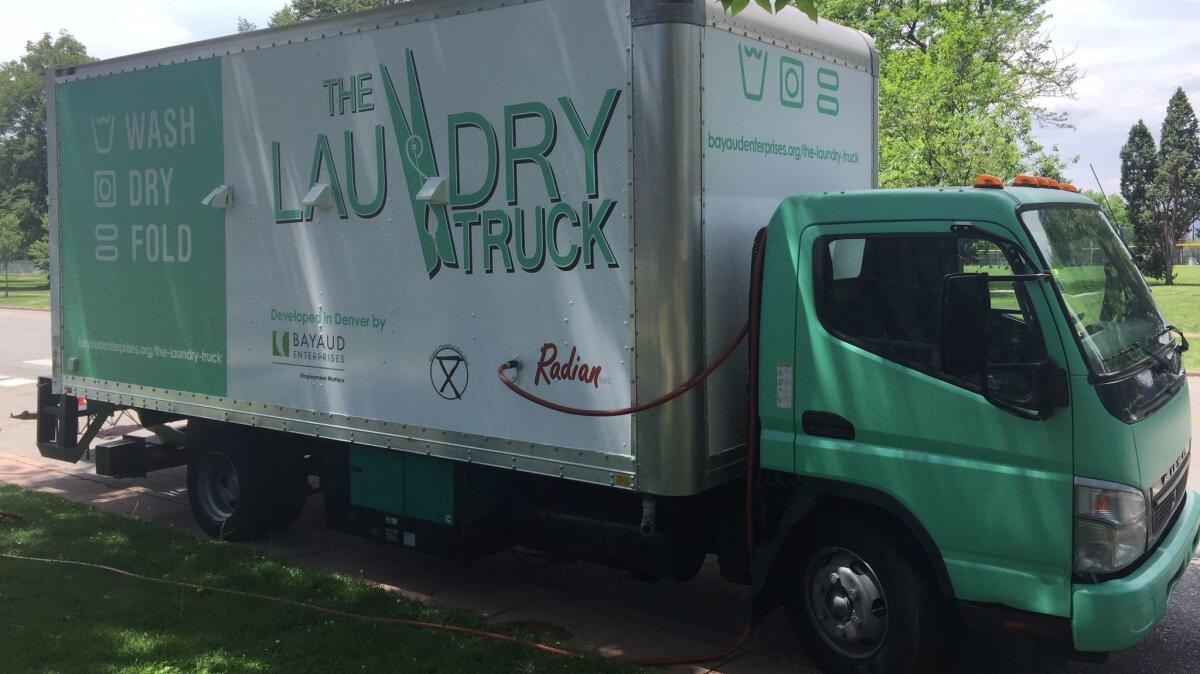Denver finds a simple and innovative way to help the homeless — wash their clothes

Reporting from DENVER — The big green and white truck hummed gently as a dozen washers and dryers on board sloshed and spun through their cycles. Every few minutes someone dropped off a bag of dirty clothes.
“We are now averaging about 300 pounds of laundry per outing,” said Marcus Harris. “Sometimes clients bring in 10 loads at a time.”
Harris, 57, captains the Laundry Truck, a 200-square-foot vehicle that cruises the city three times a week washing, drying and folding laundry for the homeless. The idea is simple enough — clean clothes improve health, morale and job prospects.
“Walking around in dirty clothes only furthers your feelings of being an outcast,” he said. “This is about basic human dignity.”
Harris knows all about it. He’s a former felon and crack addict who spent years living on the streets before getting his life together. When his clothes got so rank he couldn’t stand his own smell, he’d stroll into a store, put on some new ones and walk out.
For the last few years, Denver has been grappling with an increasing homeless population. In 2016, some 3,631 people reported living without a home in Denver County.

City officials and advocates for the homeless say skyrocketing housing costs, a booming economy and Denver’s geographical location have helped fuel the increase. Others say the state’s legalization of marijuana has contributed to it as well.
The Laundry Truck, which washes clothes at no charge, is the latest in a series of innovative approaches the city and local nonprofits are taking toward homelessness. There are now sidewalk storage lockers, a mobile restroom program and a special court, to clear warrants, held inside a rescue mission.
A Tiny Home Village is scheduled to open this month, offering a dozen 8-by-12 houses for the homeless. The city’s Central Library, a magnet for the homeless, employs two full-time social workers to address their needs.
“The mayor has said we can’t build our way out of this crisis, so we need to be more creative,” said Scott Kerr of Bayaud Enterprises, a Denver nonprofit that operates the Laundry Truck.
The organization’s executive director, David Henninger, said the one thing the homeless have in common is trauma, sometimes compounded by prison or unemployment. “We are taking one more worry from them,” he said.
The truck began life as a document-shredding vehicle. Kerr sensed it had potential. A mobile barber shop? Mobile showers? Mobile sleeping quarters?
After talking with advocates for the homeless, he hit upon the idea of a mobile laundromat.
But aside from a laundry truck in Australia and a much smaller one in Snohomish County, Wash., there was little expertise to draw upon.
“You need 13,000 watts running through the truck to make it work,” said Tim Reinen, executive director of Radian Inc., a nonprofit design group that worked with Bayaud on the truck. “Then you have six dryers operating simultaneously at 120 degrees heated by propane.”
And an 800-pound generator mounted underneath.
After several redesigns and $90,000 in donations, the truck hit the streets in April. Denver Water, a city utility, lets it hook up to fire hydrants for water and provides a meter to measure how much it uses. Since then the truck has washed 660 loads, or about 10,000 pounds of laundry.
“Ideas like the Laundry Truck let us look at things in a different way,” said Julie Smith, spokeswoman for the mayor’s Office of Housing and Opportunities for People Everywhere. “Instead of telling people, ‘Here are all the places you need to go,’ we say, ‘Where are people currently and how do we bring services to them?’”

The truck recently stopped across from Lincoln Park near downtown Denver, where many homeless gather. Harris hooked a hose to the hydrant and checked the pressure in the lines.
Jeremiah Lucero, 29, rode up on his bike. He became homeless when his mother died and now does day labor.
“A lot of guys run out on their families, but I pay $320 a month in child support,” he said. “This laundry saves me money.”
He sleeps in the park under a hedge.
A 71-year-old woman name Donna dropped off some clothes. A few years ago, the former radiology technician got sick and lost her job, and then her house. Home is now a Nissan Xterra crammed with her belongings. She parks near Denver International Airport, where she works.
“I’ve been in my car since 2014. I sleep in it, but I wouldn’t say I live in it,” she said. “I go to the YWCA for showers. I get free meals at places for being a senior citizen.”
She also poses as a guest to score free breakfasts at hotels.
“I ate at Woolley’s this morning — very high-end breakfast — sausages, yogurt, coffee,” she said. “I also like the Quality Inn, which has a great buffet.”
Donna handed Harris her clothes and headed to the senior center for lunch.
Harris was born in Denver and adopted by a pharmacist and a schoolteacher. He attended an elite private school but dropped out of college. He eventually became addicted to drugs and wound up homeless in San Diego; Pasadena; Austin, Texas; and Denver. After spending time in prison for burglary, he found work and a new life at Bayaud.
Harris doesn’t ask those bringing in laundry to prove they’re homeless. He sometimes parks in front of low-income schools and washes students’ clothes.
“The best part of my job is hearing all of their stories,” he said of his clients. “You’d be surprised by how many work and have advanced degrees or were once homeowners.”
Once on the streets, they learn to live by their wits. Some break the law in the process.
A young man in a new T-shirt and khakis admitted to shoplifting when he ran out of clean clothes. In fact, he said, he had stolen the very clothes he was wearing.
“I keep the stealing under $50,” he said. “I don’t think they really care if it’s under $200.”
Anthony Ruiz, 61, sat in a plastic chair and watched people pick up and drop off laundry. He cried when asked whether he wanted to have anything washed.
“This is all I got,” he said, tugging at his dirty clothes.
His fingernails looked like they had been chewed almost to the cuticles. Circular patches of skin were missing from his brown, leathery arms. He blamed the wounds on spiders in the grass where he slept.
Ruiz was one of 16 kids. He became homeless seven years ago after his wife died. He admits drinking too much but says he’ll probably never stop.
“I live in the alley back there now,” he said. “That’s how it is.”
Harris walked over and offered to find him some new clothes.
Kelly is a special correspondent.
ALSO
Canadian sniper kills an Islamic State fighter from more than 2 miles away, a record shot
Atty. Gen. Jeff Sessions wants to get tough on crime. These people think he’s got it all wrong
More to Read
Sign up for Essential California
The most important California stories and recommendations in your inbox every morning.
You may occasionally receive promotional content from the Los Angeles Times.










